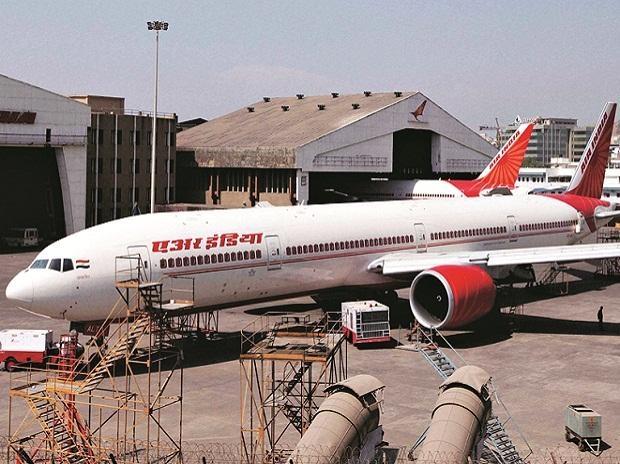Corporates Do Not Want Government As Partner, Should Government Feel Bad?

Image Coutesy: Business Standard
In the business press of the corporate media, the vilification of the government knows no bounds.
Take the aftermath of the failed first round of disinvestment of Air India (AI) that has the business papers abuzz with opinions of what went wrong and how to make the sale attractive for private buyers.
There appear to be the following three main problems that are apparently keeping investor interest at bay. The government retaining a 24% share is currently the most, and the most loudly, cited deterrent. The clauses for the absolute minimal “protection” (for one year) of its 27,000-strong employees has been a consistent grumble. And the 50% debt burden that shall remain with the new owners is the obvious elephant in the private investor room that the press is being careful in not overstressing, but is rather inducing pressure to mould the distress narrative to a point where it looks like the government had no choice but to bear the entire debt, only because demanding so in so many words at the outset would be obviously criminal.
Read More: Air India Sale: How To Systematically Kill A Public-Sector Company
The BJP-led NDA government has already announced that it will sell the residual 24% stake in AI (as apparently advised by its transaction advisor Ernst & Young) to appease private investors and induce them to buy the “national carrier” — which was deliberately laden with debt and brought to its knees by the Congress-led UPA government to clear the runway for private airlines and make the case for eventually selling off AI. Does that sound counter-intuitive now? Not really, as we shall see.
Meanwhile, the business press is using this “failure” of the AI sale to go all out to rub the Government of India’s nose into the ground — for example, by stressing how undesirable, unreliable a corporate partner the government is. This achieves
“…the GoI is everybody’s nightmare shareholder: Meddlesome, venal and, worst of all, unaccountable”, to quote one such that goes on to cite the past “record” of the Government of India having been “a troublesome joint venture partner”.
Among the cases cited to drive home the point the author at one point urges the investor who might still have “doubts” about the unviability of the Indian government as a partner to “ask Anil Aggarwal of Vedanta”, who, “having bought Balco and Hindustan Zinc in the early 2000s” is “still waiting for the GoI to make good on its contractual agreement to acquire 100 per cent control.”
While the argument above seeks to paint a sorrowful picture of Anil Aggarwal bearing the brunt of partnering with the government, it’s funny that Vedanta is being cited in an argument for kicking the government out.
Read More: Will The Modi Government Crawl To Sell Off Air India?
Even if we do not, for the moment, elaborate on the infamous company’s flagrant violations of laws and human rights and persecution of workers wherever it has set foot across the world, from Odisha to Zambia, with the most recent case being played out at Thoothukudi — even a cursory look at the Balco disinvestment, to take just one case, is enough to show who the “venal”, “unaccountable” and “troublesome” so-called partner is, and why the government actually needs to be far more “meddlesome” than it has been in the past.
Bharat Aluminium Company Limited — or Balco — was a premier and profitable public sector company producing aluminium, a company that was cash-rich with an extremely low debt to equity ratio, incorporated in 1965.
In 2001, the BJP-led NDA government sold 51% of its share holdings in Balco to Sterlite Industries (a subsidiary of Vedanta Resources) at a literally throwaway price.
The total value of the assets of Balco had been estimated by experts at around Rs 5,500 crore. But the “strategic sale” of more than half of its shares — 51% — fetched a price of Rs. Rs 551 crore to the government.
Besides the gross and unforgivable undervaluation of a prime public asset, there were charges of collusive negotiations in the name of bidding accompanied by hefty kickbacks.
Read More: The Air India Sale Fiasco is the Strongest Case for Why It Must Not Be Sold
Indeed, a report by the Comptroller and Auditor General (CAG) of India in August 2006 — the CAG Report No. 17 of 2006 — confirmed that the assets of Balco were indeed grossly undervalued.
At the time, Balco trade unions staunchly resisted the privatisation, with the 7,000-strong workers going on a continuous 67-day strike after the shady sale. They were concerned about their job security, working conditions and the local development in Korba, a backward area in Chhattisgarh, where BALCO operations are located.
They had good reason too. Since Sterlite took over, the number of workers has decreased drastically — despite provisions in the agreement that workers would not be thrown out for a period of one year after the sale. This provision was bypassed with hundreds of workers being forced to opt for VRS (voluntary retirement scheme). This was accompanied by sharp deterioration in the working conditions and facilities for workers. There have been numerous fatal accidents, including one on 23 September 2009 at one of Balco’s power plants when an under-construction chimney collapsed killing at least 49 workers and severely injuring several others. There have been flagrant violations of not just labour laws, safety regulations and payment of minimum wages, but even violations of labour-related clauses of the agreement between the government and Sterlite.
There have been other studies on the condition of the Balco workers after privatisation. One such study was titled the “Impact of Privatisation on Labour: A study of BALCO Disinvestment”, conducted by by Dr. Babu P Remesh for the VV Giri National Labour Institute, published in 2006. The study documents the suffering faced by thousands of employees. The study notes that “it was evident that various modes of coercion were engaged in implementing the VRS agenda by the new management.” It talks about the “demoralisation and trauma”, the humiliation and other pressure tactics that the workers were subjected to in order to make them leave. In fact, the study says, more than 80 per cent VRS optees complained that they had to wait for months before they received the VRS amounts and faced a hard time with officials while seeking the release of their dues. “It was generally felt that the management had not shown much interest in ensuring the timely payment of VRS amount and at times the retirees even had to bribe the concerned staff, the amount of which was reported to vary from Rs. 100 to Rs. 2000.”
The study also noted: “It was widely reported that Sterlite appointed some youngsters, who were given ‘huge’ salaries and positions, bypassing all the existing norms in recruitment. The major qualification for these managerial staff was their proximity to Sterlite authorities.”
So much for “venality” and “unaccountability".
And it’s not just labour laws that Balco under Sterlite violated, but also environmental regulations — in line with Vedanta’s gross violations of environmental laws worldwide. In September 2017, the Chhattisgarh Environment Control Board (CECB) instructed Balco to shut down a 1,200-MW power plant for violating the Water (Prevention and Control of Pollution) Act 1974. Balco had been pumping polluted water into a nearby canal, which drains into the Hasdeo river, after the ash dyke at the plant got damaged.
Another report by the People’s Union for Democratic Rights (PUDR) in 2008 on the “Judicial Assault on Workers’ Rights” noted the Balco privatisation case, saying that following the workers’ struggle against the privatisation, “the BALCO Employees Union submitted in court that due to disinvestment the workers had lost their rights under articles 14 (Equality before law) and 16 (Equality of opportunity in matters of public employment) of the Indian constitution. The union argued that, as those potentially affected by the disinvestment decision theworkers had a right to be heard before and during the process of disinvestment. They said, rightly, that there was no effective protection of the workers’ interests in the process of disinvestment.”
The workers’ petition was dismissed, and the court said “that notwithstanding articles 14 and 16, a government servant has no absolute right to remain in service; that despite these articles, it does not mean that the government has “to give the workers prior notice of hearing before deciding to disinvest”.” In fact, among other observations, the court order said, “We are satisfied that the workers’ interests are adequately protected in the process of disinvestment”, according to the PUDR report.
“In most countries, joint corporate ownership with the sovereign power would be considered a rock-solid guarantee of the stability for the company” — is how the sample opinion piece in a prominent business paper referred to earlier in this article begins. It’s unfair of the author to the GoI — especially to the ruling Modi government, friend and promoter to the corporates — to write that; after all, the Indian government has already done so much for the corporates, giving them a near-complete free hand, writing off ‘bad’ loans of corporates worth Rs 2.72 lakh crore.
Read More: BJP's Plan To Sell Residual Government Shares in Air India To LIC Is A Bad Move
To cut a long story short, the corporates, if left to their own profiteering devices and without the “meddling” — even the bare-minimum as it currently is in India — of the government, will loot the country while impoverishing and potentially killing the majority of its people. No wonder, the government is an “unwanted” corporate partner.
As for Air India, which has a debt of more than Rs 52,000 crore (for no fault of its management and workers, but due to deliberately destructive government decisions, it must be reiterated) — but has still been making rising operational profits and has never defaulted in its loan repayment, while holding highly lucrative slots at prime airports and traffic rights internationally — the agenda of the private/corporate players ought to be clear to anyone following. It is to get the government to bear the entire debt, and not just 50% as proposed in the original offer — which, to quote Tapan Sen, general secretary of the Centre of Indian Trade Unions (CITU), would be “criminal”.
The vilification of the government, in this case, is meant to not only facilitate this criminal change in the AI offer, but to help expand the contours of the larger neoliberal narrative of privatisation and the dismantling of the public sector.
Get the latest reports & analysis with people's perspective on Protests, movements & deep analytical videos, discussions of the current affairs in your Telegram app. Subscribe to NewsClick's Telegram channel & get Real-Time updates on stories, as they get published on our website.
























